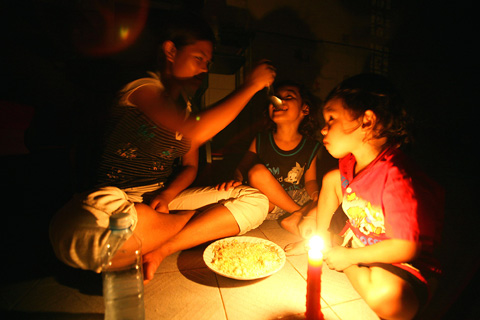Hydropower is held up as the beacon of hope for millions of Cambodians starved for electricity, with 10 planned hydro-dams set to power up their homes for the first time.
But flicking the switch comes at a price as critics say the controversial deals made with mostly Chinese companies to build the dams will create further hardship for Cambodia’s poor and ruin the environment.
For window-maker Dorn Seanghor, however, the prospect of working without being plunged into darkness is appealing. In the midst of Cambodia’s building boom his business should be thriving, but he is constantly frustrated.

PHOTO: AFP
“There’s usually a blackout for six to eight hours almost every day — one time in the morning and again in the evening,” he said at his shop in Phnom Penh.
“It disturbs my business. I use a generator when the power is cut, but the price of gasoline is very high now,” he said.
Still, Dorn Seanghor is one of the luckier ones. Four-fifths of Cambodians do not have access to any electricity.
Ten dams are set to begin churning between 2010 and 2019, and once they are all operational the government says they will generate 2,045 megawatts of power, serving all Cambodia’s provinces.
Government officials say six of the dams will be funded by Chinese companies, but the US-based International Rivers Network warned in a January report that these Chinese investments could threaten some of Cambodia’s most precious eco-systems.
“Poorly conceived hydropower development could irreparably damage [natural] resources,” the report warned.
Groups have been particularly concerned about the looming effects of Kamchay Dam, under construction by Sinohydro Corp in Bokor National Park and expected to flood 2,000 hectares of protected forest.
And now environmental groups say two more projects agreed to earlier this month at a cost of more than US$1 billion — Stung Tatay by China National Heavy Machinery Corp and Russey Chrum Krom by Michelle Corp — have not been properly scrutinized.
Both will be located in the country’s southwestern Cardamom Protected Forest, and about 1,600 hectares of woodland would have to be flooded or cleared to make way for the dams, the government has said.
This could destroy key animal habitats and upset the delicate eco-system.
“Cardamom is the last hot spot of conservation in Indochina,” said Sam Chanthy, an environmental officer with advocacy group Forum on Cambodia.
Qian Hai, third secretary of the Chinese embassy in Phnom Penh, denied his country’s companies would damage the environment.
“We just help Cambodia. All these projects are approved by the parliament and the government,” he said.
Ith Praing, Cambodia’s energy secretary, insisted the government conducted careful environmental studies for all the dams.
“Outsiders always raise environmental issues, but we need electricity. We must develop our country. We must use our resources rather than buying oil,” he said.
Cambodia has begun to climb back from decades of civil unrest to emerge as one of the region’s fastest-growing economies.
Economic growth has averaged 11 percent over the past three years, although 30 percent of the 14 million people still earn less than US$1 per day.
The government fears rocketing energy prices will scare away foreign direct investment.

A fire caused by a burst gas pipe yesterday spread to several homes and sent a fireball soaring into the sky outside Malaysia’s largest city, injuring more than 100 people. The towering inferno near a gas station in Putra Heights outside Kuala Lumpur was visible for kilometers and lasted for several hours. It happened during a public holiday as Muslims, who are the majority in Malaysia, celebrate the second day of Eid al-Fitr. National oil company Petronas said the fire started at one of its gas pipelines at 8:10am and the affected pipeline was later isolated. Disaster management officials said shutting the

US Vice President J.D. Vance on Friday accused Denmark of not having done enough to protect Greenland, when he visited the strategically placed and resource-rich Danish territory coveted by US President Donald Trump. Vance made his comment during a trip to the Pituffik Space Base in northwestern Greenland, a visit viewed by Copenhagen and Nuuk as a provocation. “Our message to Denmark is very simple: You have not done a good job by the people of Greenland,” Vance told a news conference. “You have under-invested in the people of Greenland, and you have under-invested in the security architecture of this

Japan unveiled a plan on Thursday to evacuate around 120,000 residents and tourists from its southern islets near Taiwan within six days in the event of an “emergency”. The plan was put together as “the security situation surrounding our nation grows severe” and with an “emergency” in mind, the government’s crisis management office said. Exactly what that emergency might be was left unspecified in the plan but it envisages the evacuation of around 120,000 people in five Japanese islets close to Taiwan. China claims Taiwan as part of its territory and has stepped up military pressure in recent years, including

UNREST: The authorities in Turkey arrested 13 Turkish journalists in five days, deported a BBC correspondent and on Thursday arrested a reporter from Sweden Waving flags and chanting slogans, many hundreds of thousands of anti-government demonstrators on Saturday rallied in Istanbul, Turkey, in defence of democracy after the arrest of Istanbul Mayor Ekrem Imamoglu which sparked Turkey’s worst street unrest in more than a decade. Under a cloudless blue sky, vast crowds gathered in Maltepe on the Asian side of Turkey’s biggest city on the eve of the Eid al-Fitr celebration which started yesterday, marking the end of Ramadan. Ozgur Ozel, chairman of the main opposition Republican People’s Party (CHP), which organized the rally, said there were 2.2 million people in the crowd, but